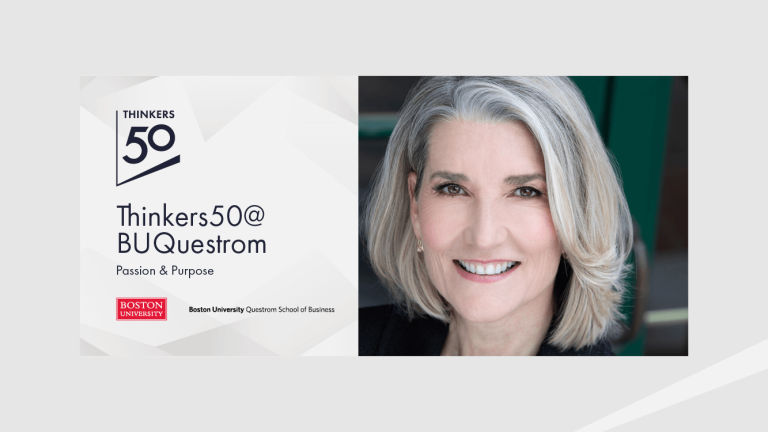

Hack Future Lab founder and disruption thinker Terence Mauri challenges leaders to lead and thrive in the unknown. At the heart of this mindset shift is asking questions that don’t just make us feel good but make us think hard. “What if it is only by learning to fail that we can hope to succeed?” This is the powerful question that Professor Amy C. Edmondson – the world’s most influential organisational psychologist – and Terence Mauri, the Founder of Hack Future Lab and a leading thinker on the upside of disruption discussed when they met for a fireside chat to discuss her upcoming book ‘Right Kind of Wrong: The Science of Failing Well‘ due out on September 12. This interview is an excerpt from the Hack the Future podcast and aims to spark conversations in organizations that if you’re not prepared to fail, you’re not prepared to learn. Mauri and Edmondson discussed why we so often miss the opportunity to fail well and shared stories of how we get failure wrong, and how to get it right. The #1 takeaway is that great lessons can be learned from learning to fail well.
You can listen to the full episode here or watch it here.
Mauri: Too many leaders live in fear of mistakes, missteps, and disappointments. Hack Future Lab’s research show’s only 28% of leaders say they work in cultures where it’s ’safe to fail’ and 70% of workers believe their voice doesn’t matter at work. Can you tell me more about your new book, ‘Right Kind of Wrong: The Science of Failing Well‘?
Edmondson: My new book, ‘Right Kind of Wrong: The Science of Failing Well,’ aims to demystify failure. It addresses the two camps of thought on failure: the belief that failure is not an option and everything must go well, and the idea of failing fast and often. I argue that both camps have partial truths and context matters. The book introduces three types of failure: intelligent failures, basic failures, and complex failures. Intelligent failures are desirable as they involve learning and innovation, while basic and complex failures should be prevented whenever possible. Throughout the book, I provide numerous stories, examples, and best practices for navigating failure and cultivating self-awareness, situational awareness, and system awareness as crucial competencies.
Mauri: Re-perception — the ability to see, hear or become aware of something new in existing information and notice the blind spots that we are blind to — is at the heart of failing well and is crucial for long-term vitality. What are some of the biggest blind spots when it comes to reframing failure as a platform for learning and growth?
Edmondson: One of the biggest blind spots is the societal aversion to risk-taking and the perception of failure as a badge of shame rather than a badge of courage. As we progress through education and into the workforce, we often become risk-averse and afraid of failure. This mindset hampers our ability to embrace failure as a means of learning and growth. To reframe failure, we need to recognize that all kinds of failures offer learning opportunities. We must be willing to take smart risks that involve failure, as intelligent failures provide valuable insights. It is crucial to shift our focus from avoiding failure to pursuing important goals and opportunities while being hypothesis-driven and taking calculated risks.
Mauri: Microsoft’s recent Work Index Study showed that 66% of leaders say they don’t have the time or energy in the day to do their jobs. Is there a direct correlation between stress and psychological safety, especially in the current environment of disruption and burnout?
Edmondson: Yes, there is a strong correlation between stress and psychological safety. The current environment of constant disruption and burnout amplifies the need for psychological safety. We are living in uncertain, complex, and interdependent times. The aftermath of the global pandemic has brought about heightened turbulence, and this sustained crisis demands resilience. To navigate these challenges effectively, we must instil a learning mindset that embraces change and novelty. Psychological safety plays a vital role in fostering an environment where people feel safe to speak up, contribute their ideas, and engage in problem-solving. It is essential to create strategies to take care of one’s self while finding joy in the process of collaboration and problem-solving.
Mauri: As we all begin to understand the role of AI in our companies, a new era has emerged. We’re standing on the precipice of a modern-day Cambrian explosion. Within the next 100 years, much of human life could look radically different from today’s world thanks to robotics, biotech and AI. One lesson in this timeline is that the change we experience today, which we think is moving fast, is likely only the beginning. How do speed and urgency impact our ability to speak up and prioritize psychological safety?
Edmondson: The rush culture and high expectations of hyperspeed and hyper-delivery can hinder psychological safety and discourage people from speaking up. In a culture focused on shallow work and shallow focus, deep work and deep focus, which are necessary for psychological safety, often take a backseat. When people are in rush mode, they may prioritize quick results over open dialogue and collaboration. This can lead to a deprioritization of psychological safety and hinder the quality of conversations. To create an environment where psychological safety thrives, it is crucial to encourage deep work, deep focus, and high-quality conversations that allow for vulnerability, open feedback, and diverse perspectives.
Mauri: Many leaders are currently stuck between the certainties of the past and the unknowns of the future. How has the world progressed in terms of embedding sustainable cultures of high psychological safety since the pandemic?
Edmondson: There is both progress and room for improvement in cultivating sustainable cultures of high psychological safety since the pandemic. The positive aspect is that there is now nearly universal awareness of the importance of psychological safety in business circles. People understand that when individuals don’t speak up or bring their full potential to work, it hinders performance and innovation. However, there is a risk of psychological safety becoming a catch-all term, encompassing from work-life balance to mental health. To truly embed psychological safety, organizations need to go beyond surface-level initiatives and create an ecosystem where psychological safety is prioritized at all levels. This involves leadership commitment, training, feedback mechanisms, accountability, and a continuous learning mindset.
From Action, I Learn (FAIL)
Without learning to fail well there’s no growing and evolving. Hack Future Lab’s research shows that a useful starting point for learning to fail well is to ask deeply human-centric questions that go big on sense-making and trust-building.
✅ Do we model ‘learning to fail well’ mindsets, values and behaviours?
✅ Do we minimise or maximise risk and reward?
✅ Do we celebrate intelligent failures?
✅ Do we obsess over trust and psychological safety, not just metrics?
✅ Do we have a culture of curiosity (embrace ideas that challenge the status quo) or a culture of conformity (reject ideas that challenge the status quo?)
If there’s a final call to action that I offer every leader remember that we always overestimate the risk of trying something new and underestimate the risk of standing still. Make this the year that you learn to fail well because there is no learning without failing and there are no successes without setbacks.

Thinkers50 Limited
The Studio
Highfield Lane
Wargrave RG10 8PZ
United Kingdom

Thinkers50 Limited
The Studio
Highfield Lane
Wargrave RG10 8PZ
United Kingdom

| Cookie | Duration | Description |
|---|---|---|
| LANG | 9 hours | Linkedin set this cookie to set user's preferred language. |
| nsid | session | This cookie is set by the provider PayPal to enable the PayPal payment service in the website. |
| sp_landing | 1 day | The sp_landing is set by Spotify to implement audio content from Spotify on the website and also registers information on user interaction related to the audio content. |
| sp_t | 1 year | The sp_t cookie is set by Spotify to implement audio content from Spotify on the website and also registers information on user interaction related to the audio content. |
| tsrce | 3 days | PayPal sets this cookie to enable the PayPal payment service in the website. |
| x-pp-s | session | PayPal sets this cookie to process payments on the site. |
| __cf_bm | 30 minutes | This cookie, set by Cloudflare, is used to support Cloudflare Bot Management. |
| Cookie | Duration | Description |
|---|---|---|
| l7_az | 30 minutes | This cookie is necessary for the PayPal login-function on the website. |
| Cookie | Duration | Description |
|---|---|---|
| CONSENT | 2 years | YouTube sets this cookie via embedded youtube-videos and registers anonymous statistical data. |
| _ga | 2 years | The _ga cookie, installed by Google Analytics, calculates visitor, session and campaign data and also keeps track of site usage for the site's analytics report. The cookie stores information anonymously and assigns a randomly generated number to recognize unique visitors. |
| _gat_gtag_UA_10408481_1 | 1 minute | Set by Google to distinguish users. |
| _ga_ZP8HQ8RZXS | 2 years | This cookie is installed by Google Analytics. |
| _gid | 1 day | Installed by Google Analytics, _gid cookie stores information on how visitors use a website, while also creating an analytics report of the website's performance. Some of the data that are collected include the number of visitors, their source, and the pages they visit anonymously. |
| Cookie | Duration | Description |
|---|---|---|
| NID | 6 months | NID cookie, set by Google, is used for advertising purposes; to limit the number of times the user sees an ad, to mute unwanted ads, and to measure the effectiveness of ads. |
| test_cookie | 15 minutes | The test_cookie is set by doubleclick.net and is used to determine if the user's browser supports cookies. |
| VISITOR_INFO1_LIVE | 5 months 27 days | A cookie set by YouTube to measure bandwidth that determines whether the user gets the new or old player interface. |
| YSC | session | YSC cookie is set by Youtube and is used to track the views of embedded videos on Youtube pages. |
| yt-remote-connected-devices | never | YouTube sets this cookie to store the video preferences of the user using embedded YouTube video. |
| yt-remote-device-id | never | YouTube sets this cookie to store the video preferences of the user using embedded YouTube video. |
| yt.innertube::nextId | never | This cookie, set by YouTube, registers a unique ID to store data on what videos from YouTube the user has seen. |
| yt.innertube::requests | never | This cookie, set by YouTube, registers a unique ID to store data on what videos from YouTube the user has seen. |
| Cookie | Duration | Description |
|---|---|---|
| DEVICE_INFO | 5 months 27 days | No description |
| loglevel | never | No description available. |
| m | 2 years | No description available. |
Thinkers50 Limited has updated its Privacy Policy on 28 March 2024 with several amendments and additions to the previous version, to fully incorporate to the text information required by current applicable date protection regulation. Processing of the personal data of Thinkers50’s customers, potential customers and other stakeholders has not been changed essentially, but the texts have been clarified and amended to give more detailed information of the processing activities.